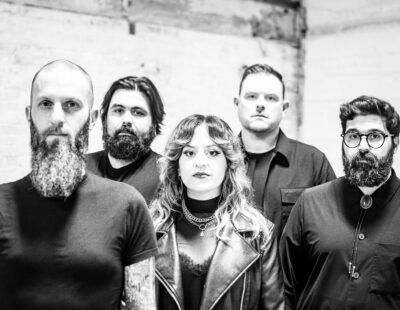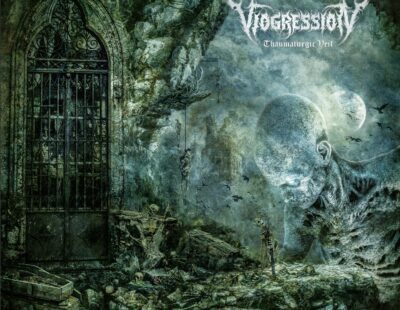
The eponymous track on Transgressive’s new EP Remember Us To Death starts with a recitation of the names of victims of transphobic violence. It’s a solemn moment before the savage eight or so minutes that follow. The EP – the band’s first new music with new vocalist Bethany “Beef” Pitts – is a defiant middle finger to the right-wing machinery that has used transphobia as a wedge issue to drive culture wars and consolidate power.
At one point, guitarist and founder Alicia Cordisco took a break from the band due to threats and anti-trans rhetoric. But the changed political and social landscape offered inspiration; her voice is stronger and more needed than ever. Cordisco spoke with Decibel about the EP, transphobia in metal and the broader culture, and why connection matters. Transgressive is working on another two-song EP and will release a new album in early 2026.
How have you coped with this landslide of ugliness in the United States?
I’m not surprised with where we are because I’ve dealt with marginalization. It’s not new to the trans experience. But it’s been escalating for a while. It started at the end of the first Trump term. A lot of the legislation and the cultural transphobia started after he lost, because it became a wedge issue to bring him back. How am I doing? It’s day to day and touch and go. It can be a little overwhelming.
What I love about Transgressive is that you don’t hide from anger. Was the music a way to process everything being thrown at the trans community?
I’ve been a metal musician for a long time, so it’s always been a vehicle for anger and other emotions. But with this band, it was a specific type of anger with an undercurrent of sorrow; there is anger at the system and oppression, and a lament for what we sacrificed. It’s also a celebration of joy. All of these emotions are combined into one through metal. Anger is easier to access, but there is also some somber reflection and some joy about being able to express yourself and live.
I always thought of metal as being opposed to norms and standards. Some fans, particularly those who are getting older, have become more conservative, if not right-wing. That’s not the message I got from the music.
That conservative contingent is a minority. I don’t think it reflects the culture of heavy metal overall. It’s ironic to see that happen. I remember discovering bands with these messages of freedom, and they later became conspiracy theorists and right-wing reactionaries.
There is a difference between being opposed to authority due to empathy and being opposed due to selfishness. Some of us see authority, and we want to counter it because we have compassion for those around us. Not everyone comes at it from that angle. Many people rebelled because it offered a solution to problems. The right preys on those feelings and co-opts them. It shows the importance of rooting rebellion in empathy.
Paul Stanley of KISS owes much of his career to gay and trans culture. Stanley later went on the record attacking gender-affirming care.
That’s a perfect example of ‘for me and not for thee.’ When we talk about gender affirming care, we aren’t talking about hormones or surgery. We’re talking about social transitions, such as wearing different clothes or going by a different name. It’s exactly the stuff these guys did! It was ok for rock stars, but it’s not ok for the kids they inspired?
I always thought one of the strongest messages of metal was that it was ok to feel like a broken person and to be lost. There’s nothing wrong with you.
Before I had the language to know about my transition, metal filled the gaps and allowed me to explore my thoughts. When I was ten, I got my first Metallica record and my first CD player. I picked up a guitar at the age of 12. I was a quiet and troubled kid and had a physically rough upbringing both in and out of the house. The music was there to speak for me when I didn’t have the words.
How did Transgressive get together?
The band started with just a two-song EP. I had just left Judicator. I wondered what to do next and had some extra thrash riffs. We recorded an EP called Seize The Means Of Reproduction that helped raise over $2000 for the National Network of Abortion Funds. When Roe v. Wade fell, we kept going. We released a few EPs and an album, and we raised a significant amount of money for Trans Lifeline. For a while, it got a bit too visible, and I needed to pump the brakes. The visibility led to threats and harassment.
Social media harassment?
Yes, comments on Reddit and different forums, death threats in my inbox, review bombing, and more. At one point, I had to talk to the security crew at Bandcamp. All of these experiences made me consider what visibility meant. I wasn’t sure if I wanted to be in the crosshairs, especially since I was in a bigger band before. Social media is stressful under normal circumstances. There was also stuff going on in my personal life. So I decided to take a break.
Later, I met our singer, Bethany (Beef) Pitts. She was gung-ho, and we’d become friends. With Bethany, I felt like I had the voice I needed to do the music I wanted to do. I always felt held back by my voice. Just having her there helped me write all the material for the next album. With Leona (Hayward, bass) and Josh (Payne, guitar and drums) on board, I had the band I wanted. This new EP is just a taste.
Did the EP come together as a result of what you’ve seen recently?
It predates it a little bit. It was mainly inspired by the deaths of trans people over the past few years. There are too many to count. Brianna Ghey was murdered by her classmates. Eden Knight was forcibly deported and took her own life. These deaths resonated with our community, but a lot of other people didn’t get the message. The boot of fascism is here. People are talking about just starting to feel it, but trans people are already dying.
The lead song starts by naming Ghey, Knight, and other trans victims of violence. It’s one thing to talk about horror in general terms, but there’s something powerful about sharing more personal details.
I wanted to ground the song in those cases. I wanted to say: look at this 16-year-old who had her life taken because of cultural transphobia.
What has the reception been like to the new material and lineup?
The EP sold like hotcakes, which is great. I always felt good about all of our musical abilities, and now the vocals are at that level too.
How did you choose to cover Aus Rotten’s “Fuck Nazi Sympathy”?
We’d always talked about doing a crust cover. I recorded it while we were on a band chat, and we had the song done in about four hours. It’s a straightforward “fuck em” song and a good contrast to this longer eight-minute song.
Have you grown more comfortable being visible of late?
After I took a step back, I chose to do this. It feels more important than ever to use my platform. I’m intentionally using it for the most good I can.
Where do you think metal is as a culture in terms of trans acceptance?
We are 100% better off now than we were 15 years ago. But we’re in a worse place than we were five years ago. I think the backslide is temporary. The reactionary people are pumping their chests, and the right wing is in power in many places. A lot of global progress is going backwards. I do see the seeds of us pushing back. As we do, we’ll go further than we have before.
If people could make one change in their lives to help, what would it be?
In the metal culture, go out of your way to promote trans and queer artists because I guarantee someone is going out of their way to do the opposite. I’d also say get to know a trans or queer person. Provide community. If the only thing you can do is be someone’s friend, do that. Some folks don’t even have that. That can go a long way.







